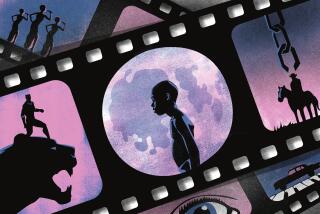PAGE TO SCREEN : A Happier Ending
In “The Road to Wellville,” author T. Coraghessan Boyle goes for the jugular, but he does so with fruit compote rather than a carving knife. The story is served up in turn-of-the-century Battle Creek, Mich., where the genuinely ill, the merely neurasthenic and the frankly bored converge on breakfast-cereal magnate John Harvey Kellog’s famed sanitarium. In their quest for perfection, which has obvious parallels with today’s health consciousness (is it a coincidence that Boyle lives in Southern California?), these people endure enemas, laughing exercises, lectures, sexual abstinence, electrotherapy and enough roughage to evacuate even the largest mammals. Boyle has great fun with the humorlessness of this enterprise, and he also has a keen appreciation for the opportunists who want to make a buck out of it.
Now “Wellville” is coming to the big screen. Directed by Alan Parker and starring Anthony Hopkins, Bridget Fonda, Matthew Broderick, John Cusack and Dana Carvey, it opens this Friday. Parker also doubles as the screenwriter, and he’s quite proud of his fidelity to the book, although he’s quick to point out that the dialogue is his. “You take the spirit of the book and the nature of the writing and I’m inspired to write lines like ‘An erection is a flagpole on your grave’ and ‘Behind every fortune lurks the shadow of a lie,’ ” he says. “You’re inspired by the writing rather than by the words themselves.”
Parker received the book in manuscript from his representatives, the Creative Artists Agency, which also reps Boyle. With book in hand, Parker then set about researching the period. Much of what Boyle wrote about is based on fact. Kellog did indeed exist, as did his sanitarium and the infernal machines and diets that tormented his patients. Consultation with Boyle, however, was not part of Parker’s research. “I think Tom was quite happy not to be involved,” Parker says. “As he said, he was happy cashing the check.”
Well, not quite. Boyle says he has all the money he needs, so he views movies like this as a promotional tool for his work--especially when it’s true to the work. “I was blown away with what Alan had done,” Boyle says. “It’s an homage to the book.”
About the only significant change Parker made occurs at the end, when Kellog corners his rebellious adoptive son by a vat of nut butter. “T.C. Boyle always likes negative endings in these things,” Parker says. “I thought the relationship had to be resolved.” Other than that, Parker’s tale is so in tune with the strangeness of the material that some audiences may have a hard time getting a handle on it.
“It’s a very unusual film, that’s for sure,” Boyle says. “It’s a very unusual book. It has the first romantic enema scene in literature--and onscreen.”
More to Read
Only good movies
Get the Indie Focus newsletter, Mark Olsen's weekly guide to the world of cinema.
You may occasionally receive promotional content from the Los Angeles Times.










